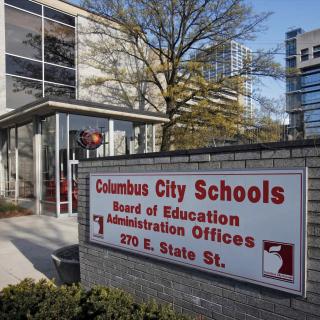Advertisement
After a five-year long struggle, the grassroots effort to give a voice to more Columbus residents will finally come to a public vote at a special election on August 2 this year. The charter amendment would expand Columbus City Council from seven to 13 members and include representatives from city ward districts. This would break the all-at-large, one-party Council system and make Columbus’ city governance comparable to other U.S. cities its size.
Grassroots groups had tried twice since 2011 to get the amendment on the ballot, but were stymied by what appeared to be politically-motivated maneuverings by the current powers at City Hall.
Represent Columbus is a coalition of Democratic, Republican, Green and Independent grassroots leaders. Building upon previous work by the Columbus Coalition for Responsive Government, Represent Columbus submitted 39,308 petition signatures to the Columbus City Clerk on May 3. The Franklin County Board of Elections determined that 19,035 of those were valid – 1,200 more valid signatures than the 17,780 required. City Attorney Rick Pfeiffer found the petitions to be “legally sufficient.”
At the May 23 meeting, Columbus City Council reluctantly voted to place the issue on the ballot for a vote at an August 2 special election, mandated by the state constitution and city charter.
Initially, the Council did not even place the item on the May 23 agenda. Prior to Monday’s Council meeting, Council members were telling people that they “may or may not” have the legislation completed for a vote that day – though the Ohio Constitution required that the Council vote it to the ballot “forthwith.”
As the last agenda item of the night, Council begrudgingly did its duty and voted on the proposal as a non-agenda item called from the floor, effectively preventing any public comment on it prior to the vote. After Council voted to put it on the ballot, they ended the meeting and turned off the CTV government access channel cameras, and only then allowed for public comment off-air.
Oh, the Hypocrisy of Council…
Having anticipated this type of repressive meeting conduct to keep proponent voices off CTV, Represent Columbus co-Chairs Whitney Smith and this writer had signed up to speak on May 23 on a different agenda item earlier in the Council meeting. We planned to mention the coming vote in our comments.
Uncharacteristically, he launched an attack. Stinziano questioned Smith about the number of neighborhoods in Columbus and what neighborhood she lived in.
Stinziano asked Smith, “Do you feel German Village is represented at Columbus City Council,” to which she replied, “I don’t feel like any neighborhood is represented at City Council. I feel that the main people that are represented at City Council are those who contribute the most to your campaigns.”
Obviously stung by that response, Stinziano regrouped, clarifying that Smith was a Republican and asking if she thought “[her] candidate Donald Trump would support doubling the size of government” (which this proposal clearly does not do) and Smith replied that “Donald Trump is not my candidate, I do not support Donald Trump, and I don’t think that question is on topic.”
The audience erupted in applause at Smith’s deft handling of the botched inquisition. Citing the decorum of council, Klein then asked the audience to “please keep your applause nonexistent.”
Observers noted that earlier in the meeting, Klein had asked for and led a round of applause for Bishop Fred L. Marshall and First Lady Evangelist Molly Marshall of Smyrna Baptist Church. As he bestowed a resolution upon them, he asked for “any questions for my colleagues before we give him a rousing round of applause?” He then announced, “Let’s have a round of applause for Bishop Marshall.”
At another point in the meeting, citizen Joe Motil spoke on the impropriety of Council members accepting campaign contributions from corporations receiving tax abatements. His remarks inspiredanother short round (10 seconds) of restrained clapping, causing Klein to issue this warning: “Please refrain from clapping, otherwise I’ll have no choice but to have the officer step in to keep decorum, we need to keep the agenda moving.”
It was official – Columbus City Council members are losing their minds knowing that the people were going to get to vote on their governance.
Public Reaction to Council’s Tantrums
In my off-camera remarks before Council on the Represent Columbus proposal, I told Stinziano he was out of line and should apologize to Ms. Smith. After the meeting, Stinziano confronted me in the hallway, insisting that the Represent Columbus effort is a Republican initiative. Observers, including me, were puzzled by Mr. Stinziano’s approach and demeanor, as he is typically among the more open minded and thoughtful of the members and sounded like he was losing it. Stinziano and current Council members are Democrats.
Radio host Chuck Douglas of 98.9 FM echoed the confusion over Mr. Stinziano’s approach during a Tuesday on-air interview with Smith and myself, saying he had confronted Stinziano about his unusually defensive remarks.
A statement to NBC by council president Zach Klein that Council districts threatened to pit neighborhoods against each other, gained further public derision of council on social media.
After an interview with WCMH NBC4’s Candice Lee, Clintonville resident Miriam Bowers Abbott wrote, “I can think of no better way to start Year #47 than with a televised eye-roll at City Council. Wards will cause a bloody civil war? PUH-LEASE. Go Represent Columbus!”
Abbott continued, “I keep wondering how they view the national representative democracy. ‘As an Ohioan, I really really hate Arkansas and Louisiana’ or maybe in the state: ‘You know, like how Franklin County keeps warring with Knox County.’ They [City Council] have the worst arguments ever.”
Earlier on WOSU’s All Sides with Ann Fisher, former Columbus City Council member Mary Ellen O’Shaugnessy said, “I certainly know a lot of people that live on the west side of Cleveland who would never go to the east side and vice-versa…they compete for resources – it really ‘Balkanizes’ the city.” (Writer’s note: Cleveland uses the ward system for its city governance. I’m from Cleveland and LMAO when I heard that “worst argument ever.”)
O’Shaugnessy said, “We need to think about how this could have German Village and the University District competing for resources” and talked about “thirteen members of council competing among themselves for resources...” When Smith asked Cleveland City Council President Kevin Kelley on the radio show about that version of reality, Kelley said those objections were baseless.
The “Balkanization” argument was repeated another time by Council member Shannon Hardin. Clearly the establishment's choreographed talking points are focused on baseless fear-mongering. No one who pays attention to Columbus City Council is surprised by the fact that no other Council member expresses a different point of view.
Community Support Grows
On Tuesday following the council meeting, Represent Columbus held a press conference with several leading men in the African American community. They gathered at the site of a murder that sparked the impetus for the charter amendment. Columbus City Council had not responded to a letter from 22 neighborhood groups seeking help to resolve drug related gun violence in the neighborhood.
Then-Council President Andrew Ginther refused to act and termed the neighborhood advocacy a “political stunt.” It was that series of events that steeled this writer’s resolve that the Council needed to change to better represent the interests of the people of every neighborhood.
Local small business owner Denise Benning hosted a meeting of community leaders on the proposal. She had been shocked by Council's inaction for the continuing drug trade and shootings taking place outside her storefront door. Expressing strong support for the Represent Columbus proposal were former State Senator Ray Miller, Pastor Dale Snyder of Bethel AME Church, Rev. Joel L. King, Jr. of the Columbus Action Network, attorney Byron Potts, attorney John Waddy and businessman Ray Jones.
In response to a statement of support by Tarrell Mock of the Minority Independent Contractor Association, Senator Miller expressed his strong support for the proposal, encouraging the 20 to support the amendment. In a Thursday meeting at the Franklinton Library, additional support came from that neighborhood’s leaders.
Will Petrik, founding member of Yes We Can Columbus and former candidate for Columbus City Council, said his group supports Issue 1 “because we believe it is time to take concrete steps to put power back in the hands of everyday people. Represent Columbus and Yes We Can Columbus will be working to build support for a “Yes” vote on Issue 1, because we believe a modern City Council system will give all of our neighborhoods a stronger voice on City Council, promote more accountability, and strengthen neighborhood services.” Yes We Can Columbus also supports a higher minimum wage and campaign contribution limits.
So with all the community support, one wonders – what is the problem?
So What is so Frightening to Council?
The proposed charter amendment seeks to change Columbus City Council from seven members elected at large in city-wide elections to a Council where only three members are elected at large and the remainder from neighborhood-based council districts, based on the city's population. With the current population, there would initially be ten members elected from districts. That number would rise as the population increases and fall if the city's population decreases.
The Council districts would be created upon enactment and revisited every ten years by a nine-member independent, multi-partisan apportionment board drawn from Columbus electors who submit applications to serve. To guard against political gerrymandering, the apportionment board will not include any elected officials, candidates for office or registered city lobbyists. No person's address would be considered in the apportionment process, which would be led by a contractor hired by the board.
District elections would be incentivized to be held in 2017 so Council member terms could be staggered with elected members serving initial two or four year terms – or by 2019 at the latest, when terms would not be staggered and all elected would serve four year terms.
“The proposal emerged because neighborhood leaders and communities didn’t feel like they were being heard at City Hall,” Petrik explained, “Neighborhood Area Commissions, civic associations and other neighborhood groups would be in stronger position to hold their representative accountable. Neighborhood groups could challenge incumbents by running an alternative candidate. The cost to campaign for a district seat is significantly less than a citywide campaign, so neighborhood groups could use that as a strategy if they felt the community's needs were not being adequately addressed.”
“Currently, local leaders and communities lack the resources to have a voice on city council and hold city council members accountable. It costs nearly $250,000 to win a city council race in Columbus. Leaders from most neighborhoods in Columbus don’t have access to that kind of money,” Petrik noted, “If we truly want Columbus to be an ‘opportunity city,’ leaders need to have the opportunity to represent their neighborhood on city council and be part of the conversation about the future of our city. Columbus has over 200 diverse neighborhoods that each have a unique set of opportunities, strengths and challenges. We can have a council that better reflects that diversity. We can transform our democracy to give every community a voice, and bring more accountability to city government.”
In the All Sides radio interview,Columbus Dispatch reporter Lucas Sullivan said, “What this boils down to is control…keeping it off the ballot comes down to control. Council could vote to just put it on the ballot, but they’ve chosen not to put something on the ballot, and part of that – I don’t know how much – is control.”
“Under the new proposal, residents and neighborhood organizations would have more access to city government. Imagine being able to pick up the phone and call your council representative with an issue. Imagine having a specific council representative who lives in your community and part of their job is to improve your community and be responsive to residents and neighborhood groups,” Petrik stated.
The charter is the people’s document – not the politicians’ document – and it should reflect Columbus resident’s values. The Represent Columbus proposed charter amendment is one way residents seek tomaintain the value of our City Council. The effort had to gather 39,308 petition signatures because City Council refused to put it on the ballot with the charter amendments it put on the ballot in November 2014 (Issues 6, 7 and 8). Because of the efforts of many interested and frustrated Columbus citizens, the choice will finally be on the ballot on August 2.
Jonathan Beard is Co-Chair of Represent Columbus and publisher of the Columbus Free Press.
Represent Columbus Community Meetings to discuss the August 2 Special Election on City Council Reform
June 2, 7pm
Columbus Metropolitan Library, Livingston Branch, 3434 Livingston Ave.
June 4, 7pm
Columbus Metropolitan Library, Parsons Branch, 845 Parsons Ave.
June 13, 7pm
Columbus Metropolitan Library, South High Branch, 3540 S. High St.




